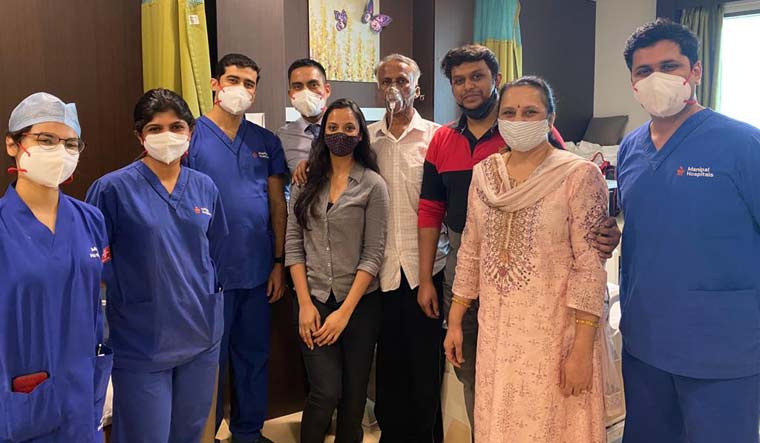Venugopala M. cannot wait for March to arrive. The 59-year-old BEML employee's daughter is getting married next month. The doting father is getting ready for the big day.
Venugopala can breath easy now. Literally. Life has been nothing short of a miracle for him, having survived a 131-day fight against COVID-19. He was finally discharged last Saturday after a lengthy treatment process.
A resident of HSR Layout in Bengaluru, Venugopala had a history of high BP. After contracting COVID-19, he developed severe pneumonia. “His CT scan report showed how badly his lunges were affected,” says Dr Rajesh Mohan Shetty, consultant, critical care medicine, Manipal Hospitals. “We determine the lung damage based on how many parts of the lungs have been affected—basically, we divide the lungs into 25 parts. If the number of parts affected is more than 16 out of 25, it is considered as severe disease. In Venugopala’s case, it was 25/25. Every part of his lung was affected. The more the lung damage, the longer it takes to recover,” explains Shetty.
Venugopala had a low chance of survival. However, his family didn’t give up on him. “We didn’t lose hope because we knew dad is strong-willed. We trusted the doctors and they kept us updated. When we were not allowed to meet dad, the doctors spoke to him and kept us posted,” says his son Manoj V. Reddy, 30, who works as delivery lead at Acuity Knowledge Partners in Bengaluru.
COVID-19 can lead to severe respiratory complications which, in turn, can take a toll on kidney and liver. “The patient’s oxygen level was low, and so, other body parts also started getting affected. The patient had low blood pressure and started experiencing drowsiness. When somebody has got such a bad disease, his kidney and liver function worsens and he will only have a slim chance of survival,’’ says Shetty.
Venugopala was given Remdesivir, plasma and steroids, but nothing worked. “His CT scan reports showed that his condition was deteriorating further. The lung injury caused by the virus was not getting better at all. At one stage, we thought there is no point in continuing like this. And we even considered lung transplant. But, after 40 days, Venugopala started showing some improvement,’’ recalls Shetty.
Mutual trust made the 131-day long journey easier, he says. “The patient's family trusted us from the beginning. They sold their property to arrange money for treatment.
“Some patients give consent to treatment, but then they think ‘the doctor is taking me for a ride’ and back out. Sometimes, patient's relatives ask you to stop treatment and say let the patient die peacefully. It is not ethically right to deny treatment to a patient.
“Venugopala's family had an experience with ECMO (Extracorporeal membrane oxygenation is a treatment that uses a pump to circulate blood through an artificial lung back into the bloodstream) with one of their family members. He was on ECMO for several days and he survived. So, they knew ECMO can save lives.”
Thankfully, it did in Venugopala's case, too.



